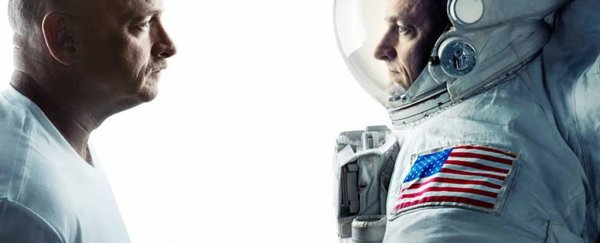Here's something to wrap your head around: when astronaut Scott Kelly went into space and his slightly older twin brother Mark stayed on Earth, the age gap between them increased, thanks to Scott's time in orbit.
Bizarre, right? And it's all down to Einstein's revolutionary theory of relativity.
What Einstein's theory suggests - and what evidence has since backed up - is that time moves more slowly for objects in motion than it does for a stationary observer. It also moves more slowly the closer you are to a gravitational mass like Earth.
In other words, we're not all experiencing time at the same rate.
The faster you move and accelerate, the more time slows down, and because Scott Kelly has been zooming up to and down from space, and orbiting the planet at around 28,200 km/h (17,500 mph), his brother Mark has lived through five extra milliseconds.
The brothers were born six seconds apart back in 1964, and now that gap is six seconds and five milliseconds.
This warping of time is known as time dilation, and the Kelly brothers qualify for both aspects of it: how fast they've been moving in relation to one another; and their relative proximity to a gravitational mass.
The latest video from MinutePhysics addresses a famous conundrum known as the Twin Paradox, where both an observer on Earth and an observer on a rocket would consider time to be going more slowly, because each would believe the other person to be doing the relative movement.
In the example of a rocket flying out and returning to Earth, it's the rotation of time as the rocket turns that solves the paradox, as well as the acceleration and deceleration of the returning traveller (the charts in the MinutePhysics video help explain this principle more clearly).
These ideas have been backed up by some solid scientific experiments - including flying atomic clocks above Earth's surface on planes, where, sure enough, the recorded times are different to those logged on Earth.
Of course, the fact that Mark and Scott Kelly are twins is significant for reasons other than examining time dilations while out in space. NASA scientists want to use the pair to assess all the ways that space travel can affect our bodies.
The reality is that Mark - the brother who's aged a few milliseconds longer, as far as time is concerned - could end up better off in the long run if Scott's extended time in space causes his body to deteriorate faster.
As Mark joked when his brother returned from orbit: "If 10 years from now, I look like I'm 60 and he looks like he's 80, you'll know what happened."
